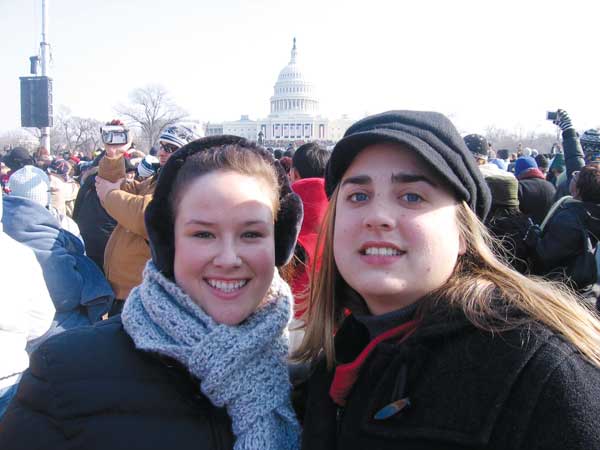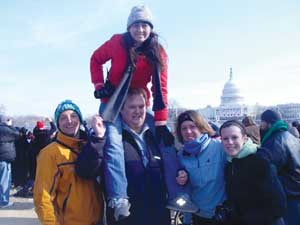Nursing Students Witness Historic Inauguration
Located only 40 miles from Washington, DC, Johns Hopkins is uniquely situated near the heart of U.S. politics. This January, nursing students braved freezing temperatures and pressing crowds to witness the historic 44th Presidential Inauguration.

Why did you attend inauguration?
Kellyn Hickey, Traditional ’10: I wanted to be there as history was made!
Elizabeth Fehrenbach, Accelerated ’09: I had to take advantage of my proximity to such an historic event. I wanted to be there, feet on the ground, to offer witness to the significance of Obama’s inauguration and my own hopes for his administration.
David Twillmann, Accelerated ’09: During the 2004 election, I was in Uzbekistan as a Peace Corps volunteer. I remember watching the election results with a group of other volunteers in a dilapidated hotel lobby, the only place with satellite TV in the area. This inauguration invoked the complete antithesis of emotions from that cold November day in 2004.
What will you remember most about the day?
Twillmann: Millions of cheers, thousands of smiles, hundreds of toilets, and only a few Fahrenheit degrees!
Katherine Woodward, Accelerated ’09:
The optimism and determination in the President’s speech and the feeling that yes, in fact, we can. We really can.
Fehrenbach:
I was incredibly moved by President Obama saying, “This is the meaning of our liberty and our creed-why men and women and children of every race and every faith can join in celebration across this magnificent Mall, and why a man whose father less than sixty years ago might not have been served at a local restaurant can now stand before you to take a most sacred oath.”

Does your choice of a career in nursing jibe with your interest in politics? If so, how?
Ellie Burnett, Accelerated ’09: I believe nursing advocacy can be a potent force for change at the societal level. All of my nursing school classmates have shown themselves, in one way or another, to be forces to be reckoned with. I believe we will mend the holes in our health care system, slowly but surely, as we expand our spheres of influence in our nursing practices.
Hickey:
I believe my role as a (soon-to-be) nurse is to help people live the healthiest life possible. How can I possibly achieve that when I know my patient may not be able to have regular check-ups because they don’t have health insurance or that they have to decide between keeping a roof over their head and buying their medication? As a patient advocate, it is my job to be politically active to make sure their voices and needs are heard.
What is the most significant change you think the Obama administration can make to improve America’s health?
Burnett: First, the pledge to “return science to its rightful place” will continue to move health care forward in its pursuit of vaccines, cures, and best practices. Secondly, better funding of our social services programs, along with more rigorous evaluation of these programs can help. Finally, a solution to the plague of a lack of insurance is needed.
Hickey:
I think it is offensive that in one of the wealthiest nations there are millions without basic health care coverage. I’ve been one of them and it’s scary. I’ll be watching to see what Obama is able to accomplish on this front.